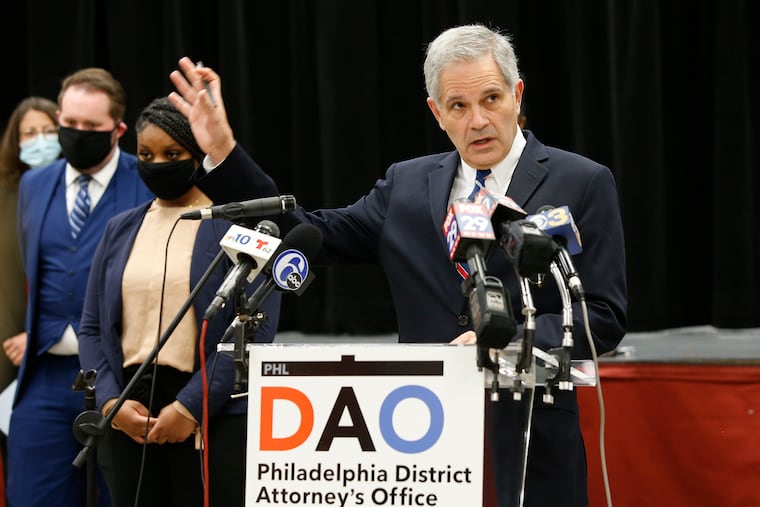Retired Philly cops knock DA Larry Krasner in the first TV ads of the Democratic primary
One of the two ads by Protect Our Police PAC features comments from women related to five people killed in the city, including two police officers, criticizing how Krasner prosecuted those cases.

The first television commercials in Philadelphia’s May 18 Democratic primary for district attorney don’t come from the candidates but from a controversial group founded by retired police officers.
Protect Our Police PAC, launched last year to oppose District Attorney Larry Krasner’s bid for a second term, is airing two ads attacking his actions and policies. One ad features women related to five people killed in the city, including two police officers, criticizing how Krasner prosecuted those cases.
“He cares more about the criminals than he does the victims,” one woman says near the end of the 30-second ad.
The other ad cites an increase in gun violence and homicides during Krasner’s term and says “Black and brown communities have suffered the worst.” The ad accuses him of releasing violent criminals “back into our communities.”
“Larry Krasner’s dangerous policies have deadly consequences,” a woman narrates. “Save Philly and fire Krasner on May 18.”
Protect Our Police is spending $45,000 to air the ads on cable television for a week.
Krasner campaign manager Brandon Evans said the District Attorney’s Office is “sorry that some are dissatisfied” with how some cases are resolved and said the staff “empathizes with the pain people feel when they lose loved ones, and we do not prioritize anyone’s well-being over the survivors of violent crime.”
» READ MORE: Philly DA Larry Krasner and challenger Carlos Vega enter election homestretch as gun violence surges
Protect Our Police has received $80,000 since last summer from the local chapter of the Fraternal Order of Police, the police union, which has also given $25,000 since December to Krasner’s primary challenger, Carlos Vega.
“Unlike Protect Our Police or our opponent, we think the truth, rather than fearmongering, is important,” Evans said. “Larry’s office investigates and prosecutes every serious case where the police make an arrest and bring in evidence to prove the charges, especially cases involving guns.”
Vega, a career homicide prosecutor Krasner fired when he took office in 2018, denounced Protect Our Police this month after the group issued a fund-raising email that blamed George Floyd for his own death and said former Minneapolis police officer Derek Chauvin is on “trial for a murder he did not commit.”
The group apologized for the email and said it fired a national marketing firm that sent the plea for donations, calling it “tactless messaging.”
That wasn’t Protect Our Police PAC’s first brush with controversy.
The group, which backed candidates it saw as pro-police for prosecutor and other elected offices around the country last year, was criticized for a billboard it posted attacking a Democrat running for district attorney in Savannah, Ga.
The group rejected complaints that the billboard was racist because it made it seem like the challenger, who is Black, supported violent protest, and that mailers it sent attacking the involvement of billionaire philanthropist George Soros in the race were anti-Semitic.
The Democrat in that race, Shalena Cook Jones, defeated a two-term Republican incumbent.
Soros used a political action committee to spend almost $1.7 million to help Krasner win the 2017 Democratic primary. It’s unclear if he will back Krasner again this year.
Protect Our Police PAC raised $738,000 in 2020, with $500,000 coming from Republican megadonor Timothy Mellon of Wyoming, who also gave $20 million last year to a political action committee trying to help former President Donald Trump win a second term.
Mellon self-published a 2015 autobiography that described Black people as “even more belligerent” due to social-welfare programs, which he called “slavery redux.”